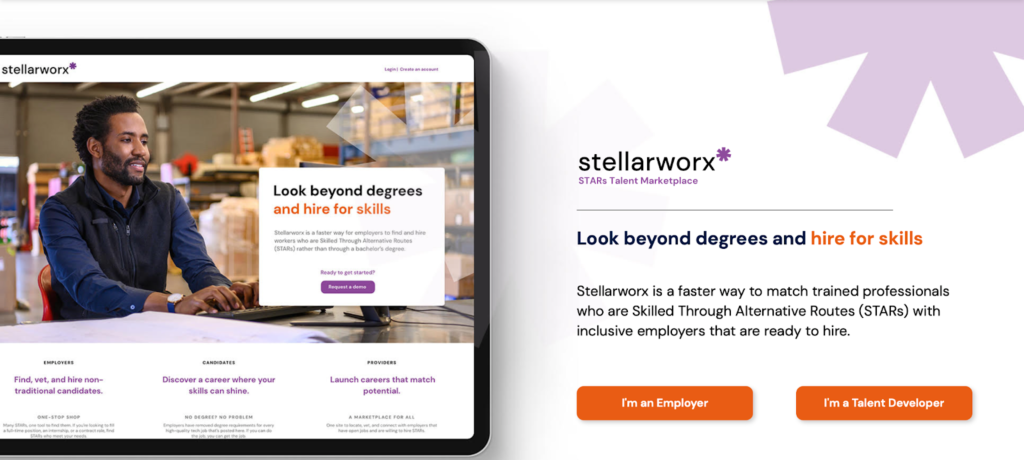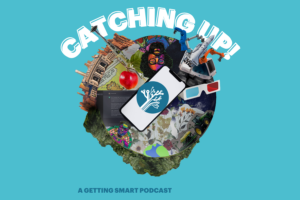Among The STARs: The Rise of Skills-Based Hiring
Key Points
-
Diversifying your talent pipeline is challenging through traditional methods.
-
Prospective employees often understand their value but aren’t able to communicate it to employers.
-
By sourcing talent Skilled Through Alternative Routes (STARs), employers can tap into a previously overlooked talent pool of 70+ million workers.

Many of us have become increasingly aware of the gaps in the workforce. While oftentimes the blame falls on the shoulders of talent and perceived lack of candidates, this gap is oftentimes more related to the fact that recruitment officers aren’t sure how to match skills with workplace needs. This process is time-consuming, subjective, and often requires a great deal of translation with regards to value-adds, talents, and skillsets. Numerous technologies and organizations have tried their hand at reducing the cost and time of hiring, but it remains a huge pain point for organizations of all sizes.
Six years ago, Byron Auguste worked to support and grow TechHire, a White House initiative that focused on building career pathways and matching tech experiences to jobs. This helped to catalyze Opportunity@Work, an organization that focuses on supporting workers who do not have bachelor’s degrees but are Skilled Through Alternative Routes (STARs). By engaging with corporate, philanthropic, and workforce partners, the organization has united efforts to directly address the barriers that STARs face in today’s labor market.
Opportunity@Work’s research aims to show employers the importance of the STARs talent pool. Through their STARs Insights Initiative, for the first time, there was dedicated research for employers to understand STARs values, skills, and opportunities for upward mobility.
“We define STARs as individuals at least 25 years old who graduated from high school and have skills but don’t hold a bachelor’s degree. Many STARs enrolled in college but didn’t complete their degree due to family or financial circumstances. Others have a two-year community college degree or received technical training through workforce programs, online credentialing services, or certification programs. Still, others are self-taught or developed their skills on the job or through military service,” says the Opportunity@Work website.
Many companies desire diversifying their talent pool, but struggle to get outside their traditional pipelines — this is where we come in.
Mason Pashia
Putting It Into Action
In order to better provide matchmaking capabilities, Opportunity@Work created Stellarworx, the STARs Talent Marketplace. Stellarworx is a faster way to match STARs with inclusive employers that are ready to hire, while uniquely integrating talent developers to validate candidates’ skills. This platform “hires people for their potential, not pedigree,” helping employers to identify diverse and growth-minded candidates more efficiently.
Recently, Opportunity@Work hired Bridgette Gray, a long-time advocate for alternative pathways and employment, as the Chief Customer Officer. Gray will work to grow Stellarworx’s reach and push the STARs brand to new heights. Gray joins Opportunity@Work after seven-and-a-half years at Per Scholas, where she was their first Chief Impact Officer, responsible for managing all training operations, and organizational impact for Per Scholas’ 17 campuses.
“Many companies desire diversifying their talent pool, but struggle to get outside their traditional pipelines,” says Gray. “This is where we come in.”
Gray says that she feels optimistic about the future and the fledgling momentum of skills-based hiring, however, it is not moving fast enough. “We have to also ensure that DEI is central to skills-based hiring and that workers are realizing their own value.”
Down the road, Opportunity@Work would like to see the STARs language widely known and used. Gray says that could be the STARs logo appearing on job applications, badges to indicate STARs hiring on websites, career listing sites, and more. This hopeful signal has great potential to become adopted and spread throughout the workplace.
Opportunity@Work COO Shad Ahmed shared, “with employers across the country reporting talent shortages, while millions of STARs are sidelined from opportunity, we know the sky’s the limit with Bridgette on board.”







0 Comments
Leave a Comment
Your email address will not be published. All fields are required.